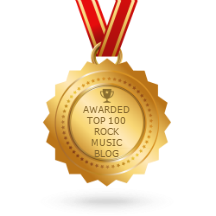An indepth Interview with Robert Berry, how he got into the business, his relationship with Keith Emerson and the band 3
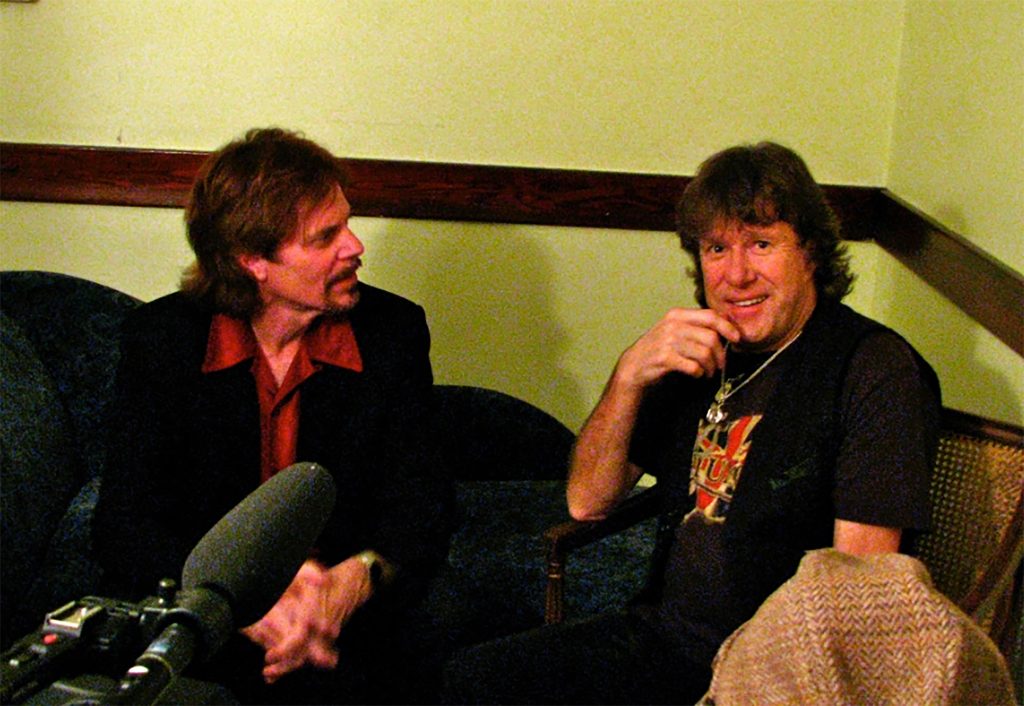
The working relationship between legendary keyboard player Keith Emerson and singer and multi-instrumentalist Robert Berry started in 1987. The plan was to form a more melodic, song-oriented band (compared to ELP), which would allow Emerson, Berry, and Palmer to follow in the footsteps of the success that Asia and GTR were enjoying in that period. The result of the collaboration 3, and the album “… To The Power of Three”, which was released in 1988. The first single, “Talkin’ ‘Bout” reached #9 on the Billboard Magazine charts and the band toured the US to support the album.
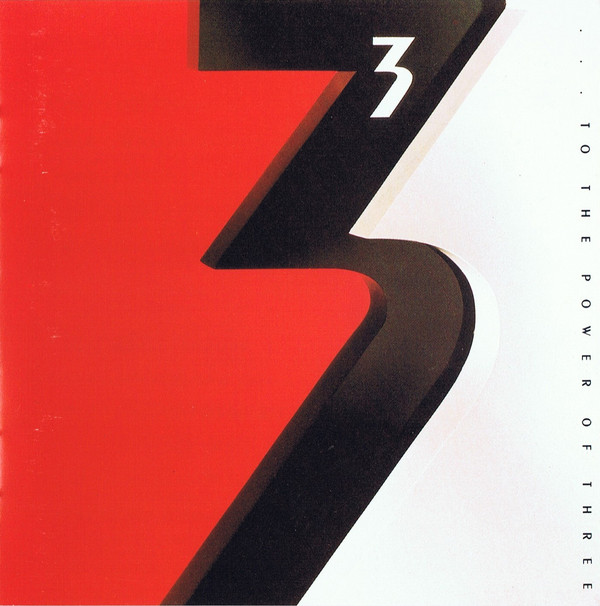
Fast forward many years, and Robert began speaking to Keith about finally releasing a follow-up, and there was an exchange of musical ideas and song collaborations. After Keith passed away, Robert was left with Keith Emerson’s final musical ideas, and from old cassette tapes, keyboard parts written over the phone, to long discussions about style, the framework of the album was set and ready to be produced. After several months of grieving and contemplation about what to do with these co-written songs and musical fragments from Emerson, Robert decided to resume work on the material that was created and craft a record that would ultimately be a fitting tribute to Keith Emerson’s musical legacy and at the same time re-energize and update the musical style started with ‘3’ some 30 years ago. The result is the forthcoming release by 3.2, ‘The Rules Have Changed’, due out mid-August.
I purchased the original album as soon as it was released, 30 years ago, and had always enjoyed it. After the demise of the band I came across Robert’s work here and there, and when I heard that there was a new album coming out I jumped at the opportunity of catching up with him for a chat.
Who or what first got you interested in music and what were your inspirations during this period?
My first recollection of being fascinated by music was when I was quite young. My dad had a big band, and my mom was the singer. They played music like Frank Sinatra or Benny Goodman and there was lots of sax and trumpet around the house. Somewhere in an old 1/4 tape, there is a recording of my dad saying “get that kid out of here”. He had made the mistake of giving his 4-year-old son the drummer’s old snare drum. Just a side note, I still have that drum and have used it on many of my early recordings before 1985. With their band always rehearsing in the living room I got the music bug fairly easy. The song on the new album “Powerful Man” is actually about that kind of influence. I’ll talk about that a little later,
I had eight years of classical piano lessons and two years of jazz piano lessons. I didn’t like to practice my piano so my dad asked the teacher if she would teach me some boogie-woogie songs. Well she was not too happy about that, but my dad owned the piano store where she taught, so she had no choice I suppose. The boogie-woogie could go on for hours, but practicing the classical stuff rarely came through unless my mom stayed on me. And she did. Since my parents had the piano store and my teacher was their prize teacher, I had to be her prize student. I was entered into countless music teacher recitals where they show off their best student to all the other music teachers. I don’t believe I was her best student though. The problem was that you couldn’t play the boogie-woogie pieces at these things, strictly very difficult music from the classical composers: I knew them all. I look at that music now and can’t believe that I played it at such a young age. I wish these days I could just sit down and whip out a Beethoven or Bach piece. Again, this is for later but with the new album, I had to get my piano playing back up to that standard.
When I was 12, two guys that were seniors in high school (17, 18 years old) came into my dad’s music store. They had heard I could play and thought they’d get free music equipment if they had this little kid with the dad that had the well-known music store son in their band. I joined up, they didn’t get free equipment, but I got a head start playing some classic older rock and roll that gave me a great foundation for what was to come.
How did Hush come about?
I had been in a few bands during high school. Some decent bands with some very good players for young guys. But nobody had started as young as me and I seem to be a little ahead of the curve. I was majoring in music in college and playing in a nightclub at night with a fake ID so that I could buy a new BMW: it had been on the top of my list for a few years. The drummer in that band, Mike Dimock, also had a dad that owned a music store. In fact, I taught piano there and sold Fender guitars and amps for him while I was in high school. I knew their family well and Mike and I had really hit it off. After a year or so of playing the nightclubs, a local booking agent called me and said he had an idea, he wanted to put myself and Mike with two other guys and put together sort of a local supergroup. It sounded like a cool idea, so we met, liked each other, and started to rehearse for the next two weeks before a big showcase for booking that was coming up. We had ten minutes to fill. The idea was to segue six or seven7 songs together, playing a verse and chorus of each, so that we could showcase more of what we would be playing for the listeners. No band had done this before, and at that showcase, we got all the gigs.
The buyers were local high school and college bookers and they loved what we had brought to the show. By the way, I had got my dad to contact a big importer of English musical equipment to the US and find out how I could get a Mellotron. Yes, it was the first time a local audience was exposed to real violins, choirs, and flutes. We were a force to be reckoned with, LOL. The only bad thing was that the newly named Hush had only learned a verse and a chorus of six or seven songs, we didn’t have time to learn the whole song for this showcase. So now we had 20 or 30 gigs starting in about a month and we needed to have two hours of music ready to go. It was a great way to start a new band. Years later my band 3 kind of started in the same way, we had two songs to present to record companies and that was it. We got signed immediately by Geffen and had a short lead time to get them a full album.
How did you first meet Keith Emerson?
I had met Carl Palmer about a year earlier, it had been recommended he listened to my cassette tape by John Kalodner at Geffen Records, Asia’s label. We tried for six months to start a band with a few different people but nothing seemed to click. My manager, Brian Lane, called me one day and said that he wanted me to meet Steve Howe. Steve Hackett had left GTR and they needed a songwriter and guitar/keyboard player. I thought it sounded really interesting so I met Steve at his home. We hit it off really good with the songwriting and as friends. He is quite a talented guy if you didn’t know. LOL Oh, I thought you probably did. I spent the better half of the year writing and rehearsing with GTR, but had difficulty with their singer. I had told Brian that I was willing to give up my solo career and my possible new band where I’d be singing with Carl Palmer, for GTR if I could at least sing one song on each album. I thought that was the deal but the singer was having nothing to do with that. In fact, even when I sang harmony or background parts of some type he would come out and double me live right there on my mic.
I decided that this wasn’t a good fit for me so I left GTR and had planned on heading home from London. Brian Lane called me the day before I was to leave and said that Keith Emerson would like to have lunch. I was a little shocked, I had just backed out of my first big break and was a little unhappy about my decision. I accepted the invite of course but was quite nervous about meeting him. I had spent time with several big names before but this guy, the king of the keyboards, the Jimi Hendrix of the keyboard players? We met for lunch and right away he made me very comfortable. Such an easy going, fun, warm personality. I thought I was meeting some mad scientist or some computer programmer type that didn’t speak the kind of English us common folk speaks. But he was the exact opposite. We hit it right off and spoke of plans to possibly start a new band. At the end of what was about a two-hour lunch, he said he only had one thing he wanted to ask me. I thought uh oh, what could it be? Maybe he wanted to own all the songs? He wanted to be the singer? LOL funny if you ever heard him sing – but no he simply said: “would you mind playing a few ELP songs if we go on tour?” I told him I’d be honored and said I would never expect him to leave behind such a legacy. I saw another part of his personality right there, he looked at me with those caring eyes of his and said “really?” I didn’t get it then, but years later as we spent time writing, recording, and touring I realized that Greg had made things very difficult when it came to control. I, on the other hand, am a team player and want the team to all benefit equally. He was pleased as we parted that day. Then came the first trip out to his house in Sussex with Carl driving. To say I was excited, well I don’t think I have to explain to any of your readers how I felt. It’s hard to put into words anyway.
ELP broke up in 1979, reforming as Emerson Lake & Powell in 1985 and releasing that album in 1986, but two years later it was 3 who were together and releasing an album. How did that all happen?
3 actually got together in the middle of 1987, we wrote and recorded a few demos. After sending them to Geffen we went in and did a video to the song “8 Miles High” we had been working on. Brian had hired a video crew for a thousand pounds to spend two hours with us. His only instructions were to make the video look like the movie ‘Close Encounters’. Not sure what he really meant, but the crew took it to mean lots of lights blurring out the camera when they were shooting past us. It was genius to me. That video looked so energetic and actually had the feel of what we would become on stage, a much less formatted band than ELP was. We had our parts that were written in stone, but there was room to jam and expand in a different way every night. That came across in “8 Miles High” before we had ever stepped on a stage together.
There was a lot of damage left behind by Emerson, Lake & Powell financially: they played arenas and rarely sold out so they lost money. As much as I loved the album and loved Cozy’s playing, it just wasn’t the draw without Carl. 3 decided to start as a new band would start, bring this new album to the fans in small venues and we played something like 1000 to 5000 seaters. Sold out, fans seeing Emerson, Palmer, and the new guy ‘Yank’ up close and personal, Never before or never again would that be possible, it was truly a great experience. We also made a profit and didn’t create any loss for anybody involved in our tour and business. Keith owed so much money from the Emerson, Lake & Powell disaster that he thought he didn’t make any money with 3, but that was so untrue. 3 paid off his debt so he was free of their past. Just to show you how well we actually did, I built a house in a very nice area of Silicon Valley and paid cash. Not that the band was about money. It wasn’t. We were about starting their career in a new way and mine in a first launch.
We had hoped for longevity and of course a hit record. We got the hit record with “Talkin’ Bout”, # 9 on the Billboard charts which brought us new fans. By the time it rose to the Top 10 we were seeing younger people coming to the shows: the Ritz in New York actually had quite a few young girls in the audience. They wanted to hear that new band that they had heard on the radio, but then there were the die-hard ELP fans who wanted to hear ELP material. They wanted nothing to do with this new guy that wasn’t Greg Lake. This began to takes its toll on Keith, and he would get quite a few fans telling him that they hated that he was playing on more pop-rock songs and they hated the female background singers. In fact, one guy wrote him a letter that it was embarrassing for Keith to be doing that. He left his phone number on the letter and Keith called him, he was sensitive that way. All this criticism led to 3 breaking up after just a year and a half of working together. Right, when we knew who, what, and how we should do a follow album up Keith was done with it. I would find that in later years that fan criticism really held a spell over him,
Were you simply asked to step aside so Lake could return?
I explained a little bit about that in the previous answer but let me just say this – Keith and Carl had always told me to be myself. Do not do what you think the fans want or what Greg would have done, just be you. There is nothing more empowering than two of the greatest musicians in our lifetime wanting me to be me. They had also had their fair share of problems with Greg. Don’t get me wrong, I actually only met Greg once and we got along great. I am a fan of his voice, his playing, and that special thing that made him great enough to take John Wetton’s place for one show in Japan: the job he did with that was amazing. But as far as ELP was concerned, he wanted the power and made most of the money. He wrote the hit songs and the writer gets the publishing dollars and therefore lots of times seem to have a bigger say so. I think Keith especially felt slighted by that. After all, who in the band was the only one of a kind? From 3 on, the ELP reunions were about money. Of course, now remember that this is my point of view, but I did remain friends with Keith and Carl and you can read between the lines during certain conversations how they felt.
3 was very high profile, yet from there you appeared to take a step into the shadows as it were. Was that a conscious decision, and if so, why?
This is a very interesting point of view for me. It actually made me think about all the other musicians I love that seem to disappear for a while. What happens to me is a book of its own. I had many songs I had written with Steve Howe. I had many songs I had written with Keith and Carl, and I had songs during that period that I had written for other purposes. One day I was working in my studio with Andy Latimer from the band Camel and he asked me about all this material, and asked what I was going to do with it, to which I said “nothing”. Those bands are gone for me. He told me that he thought I should put it out, fans would love it, and it was just laying around anyway. I thought about it and decided to take his advice. I put out ‘Pilgrimage to a Point’ mail order from my studio and it sold like hotcakes, I couldn’t believe it. Not high profile, but honest and rewarding. Then in the mid-1990’s, I got asked to play with Sammy Hagar as he was having problems with Van Halen and needed a bass player for his solo gigs. This was a great time in my life, Sam is a dynamo, to say the least. It was the hardest rock as in Hardrock that I had ever done. I found myself enjoying that edginess so I wrote an album I called ‘Takin’ it Back’. To me, it was time to take back my career and I wanted to move forward. I signed with a company in Germany that went bankrupt about three months after my album was out, strike out for me.
In 2004 another opportunity came up, I got asked to join the band, Ambrosia. I was thrilled, one of my favorite bands. The perfect blend of progressive and pop. I got to sing songs like “Life Beyond LA”, progressive, and “Biggest Part of Me”, beautifully crafted blue-eyed soul-pop. I spent two years trying to get them to do a new album. I had a studio, two of the other guys had studios, and I couldn’t get them to budge. I had written a few songs that I thought were really good for that band, and Joe Puerta the bass player had a few that were really good already but I just couldn’t get them to move on it. I learned something very important during my time with them. Their material was so demanding to sing, that when we toured I would constantly gargle with Listerine so that I wouldn’t get sick. For the first nine months, I was doing great. But as time went on my voice got rougher and rougher. By the time I gave them notice that I was going to leave, I was struggling with some of the high notes vocally. What had happened, and what I didn’t realize, was that the alcohol in the Listerine was stripping my vocal cords. Just like the way alcohol dries out a wound when you put it on your skin, it dried out my vocal cords. I didn’t realize this until six months or so later when I was a little under the weather for a gig I was doing, so I drank lots of water. All of a sudden I realized I was singing better than I had in years. The show I would do locally was a sort of greatest hits of my career, so I’d actually play “Talkin’ Bout’” and I’d also play “Biggest Part of Me”, both very demanding, and they were flying out of my mouth with ease. I did a little research and found out what I had done to myself by gargling the Listerine. So we move up to around 2008 and I get a call from Greg Kihn, his bass player Steve Wight had a stroke and he needed someone to fill his shoes. From then on I’ve been touring and writing songs with Greg. He’s a very prolific guy and lots of fun to work with. The music is very simple and it was a challenge to wrap my head around at first. But we put out an album last year that got very high marks from all the reviewers and Greg Kihn fans. So to answer your question – LOL, I have been busy trying to stay in front of an audience but sometimes things don’t go as planned. I have a song on the new album that Keith and I wrote called “What You’re Dreaming Now”. It’s about moving forward. That my motto – ‘today was a good day, now what can I accomplish tomorrow’. You can’t let disappointments or failures stop you.
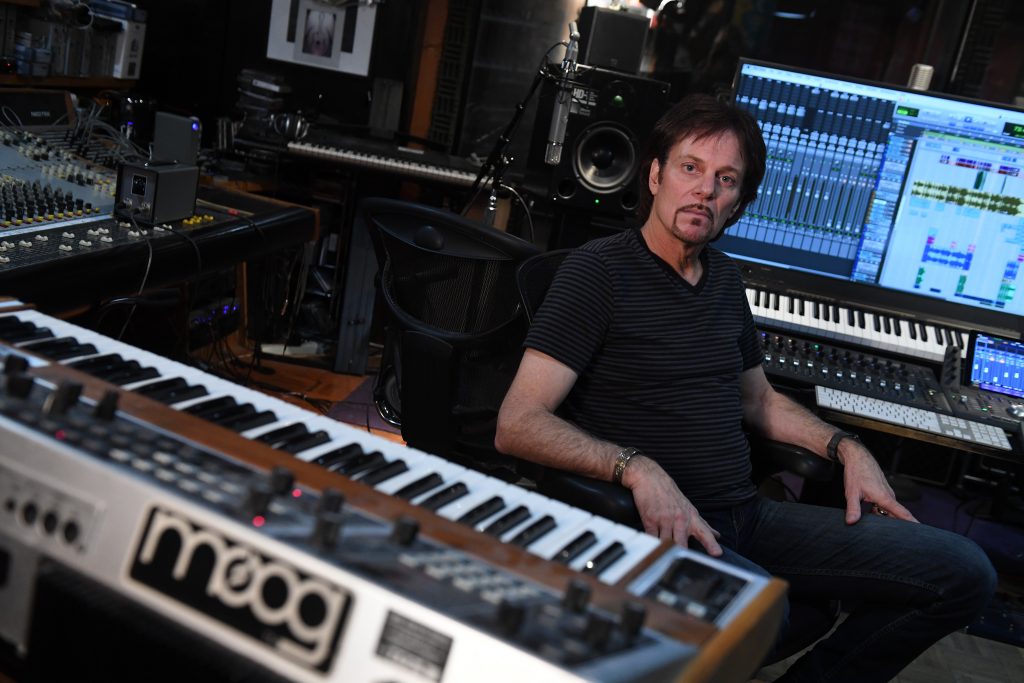
I have come across your some of your work with different musicians over the years
I have been blessed with the gift of creativity. I am never at a loss for a lyric, a musical section, or for that matter a complete song. One of the great joys I have is working down at my studio Soundtek. Five days a week, when I’m not on the road, I work with mostly unknown singer/songwriters that are at my studio to record their most important work. That song that came out of them, that is unique to their life that will live on forever in their families. They don’t have to be famous, they don’t even have to have a completed thought or arrangement, I am there to do the parts that they don’t have. Be it lyrics, chords, arrangements, or just playing the instruments to complete their vision. I do from 100 to 300 songs a year for clients like that. Sometimes I have bands like the Celtic rock band Tempest in the studio and I am mostly producing, I have done twelve albums for them over the years. I love every bit of my musical life. Nobody is too small or too big, it’s all just music to me. Imagine if Keith and Carl would not have given me that same opportunity, you would not be talking to me now.
Why 3.2, and why now?
Why now is a loaded question, as for 28 years Keith had wanted to leave 3 behind. He would always say how much fun we had, but never really talk about the music, the criticism was hard on him. But then a record company wanted to put out the 3 ‘Live in Boston’ performance. It was really just a paycheck for Keith at the time so he signed the deal. I was very excited that there was enough interest in 3, that 28 years later a new album would come out. Not really thinking about it again, Keith received the CD in the mail. He was home alone one evening, enjoying a glass of wine as he’s been known to do, so he decided to put on the CD. He listened to the whole thing and immediately called me. His voice sounded so excited. He said “Robert, we were really a good band. No really a good band.” I couldn’t believe my ears. I had always thought that but never thought he’d give it another chance, and there it was. The open door to my 28-year dream. After we spoke about how much fun we had had and how the spark on stage with the jamming was just the best time ever I broke the question. I said that a record company had been bugging me for years to do a follow-up album but I knew he wasn’t interested. I said “What about now Keith? Any chance you’d consider working with me to do one more really great album?” He gave it a mild “yes” and that was enough for me. I called the record company and asked if they were still interested, they were. I called Keith back, we discussed the ideal parameters for such an album and the record company agreed to every detail. Keith was amazed at their deal, the advance involved, and the interest being so high. He was ready to start so we did.
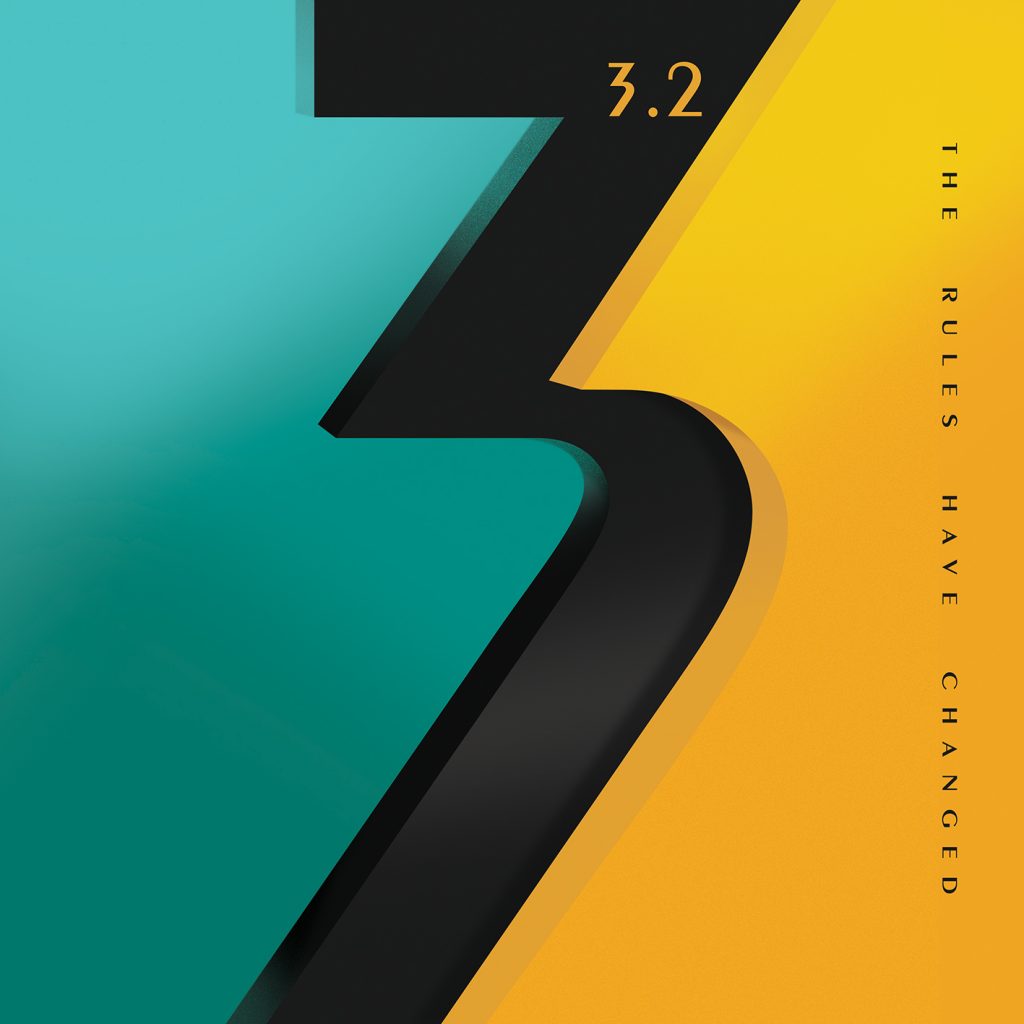
How much of the material was originally developed at the time of the first 3 album?
Only one of the songs came from the original 1986 or 87 cassette tape. There were also some linking section for new songs and some solo chord sections I used from that cassette. The rest was written from new digital files Keith had sent me, and lengthy phone conversations where we both had our digital pianos going and would play back and forth: I would record my version of what he was playing on the other end of the line. A lot of times he would say “no, no, you’re missing a note there” or “that chord needs the 9thwith the …” That was fun. He was creating and teaching me his ideas at the same time, as I would consistently miss a little subtlety that was Emerson-esque. I had about 20% of his parts already done and played by him on the album.
Was the original plan for you and Keith to work on the new release together?
This was to be the follow up 3 album, there was only the idea that we were to continue where we left off. We had talked to Carl and he was committed to his own band, so that was not a consideration. Our actual choice for the album was Simon Phillips, but we weren’t going to even talk to him until we had got together at Soundtek and recorded the basic parts of the newer songs.
Keith and I lived fairly close to each other, while Carl was always on the road. To be honest with you, and maybe a little snobby, I had been disappointed in the efforts of ELP since 3. I didn’t hear that fiery playing, those amazing arrangements, or the greatest songs. ‘In the Hot Seat’ wasn’t too bad, but after that, I just didn’t feel that they were playing up to their potential. It wasn’t that they weren’t capable, I believe it was just the spark of creativity was not gelling after all these years. I also didn’t care for the Keith Emerson Band stuff. To get the most out of Keith I believe you have to either be a keyboard player and speak his language or just piss him off so much that he brings all that energy to the playing, LOL. That was referring to the way it sounded to me that he and Greg had worked at times. Again, just my point of view and not based on me being there at the time.
What’s next?
I do have some more pieces on that cassette tape, and I have lots of music in those digital files he sent me. But my heart is with this album. There will never be another phone conversation, a goofy joke, a happy day, a stressful day, an idea that is burning to get out that includes a very brilliant, lovely man with a heart of gold on the other end of the phone. This was my last chance to work with my friend, the bandmate of my greatest success, and to complete a 30-year dream. This is the only time this could ever happen.
Will a band be put together to tour?
From the beginning, Frontiers wanted us to do a few live shows. Keith was not keen on this as his arm had been bothering him and he was trying to wind down the live performance. We had the exclusive right to choose if and what we did live, so my idea was just to let it set until we saw how the album had done. He would consider it if he felt like it, which was good enough for me. Now, of course, that can’t happen where Keith is involved. But I must say that the response to the album has been so wonderful that I am trying to work on a tour now. I had no idea that so many fans of progressive music would discover this album, and take it to heart for exactly the reason it was done. A follow up that gets what 3 should have been, right. Fans have embraced it, and that has sparked my interest in taking it on the road. Hopefully, there will be an extensive tour early next year. That is what I am dreaming now to coin a phrase!
What will the next piece of work be from Robert Berry?
In all honesty, I am feeling like the 3.2 tour may be something that keeps me on the road a lot and working more progressive concerts and productions. It’s funny to say, I think it’s time as I’ve been waiting for this for 30 years but —it’s time!
As I said earlier, I am in the studio every day that I’m not on tour with Greg or playing somewhere solo. In November/ December of every year, my holiday band December People gets together and we do shows for different charities. December People is Gary Pihl, guitarist from the band Boston, David Lauser, drummer for Sammy Hagar, Dave Meed, keyboardist for The Tubes, Jack Foster from the Jack Foster band, and myself. It is a special brand of holiday songs you have to hear to believe. You can check out the website if you enjoy rock Christmas music but you’ve never heard something like these versions.
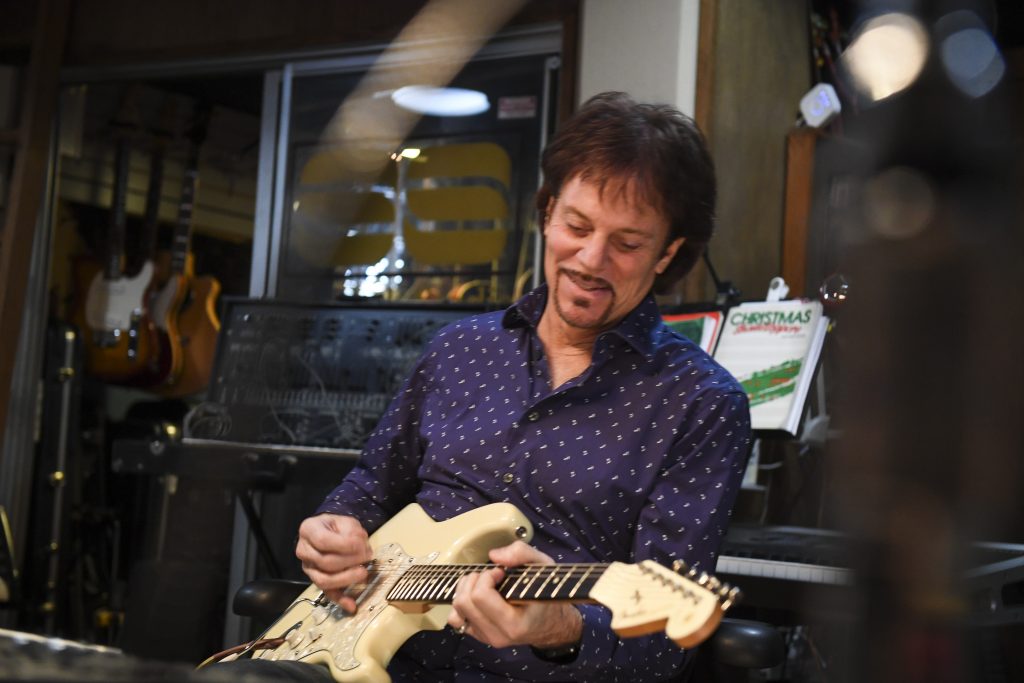
Throughout all this, I will be enjoying studio clients from 13 years old to 70 doing what they have always wanted to do – record their original songs. I love it and it also keeps me finely tuned for when that song pops into my head or just some idea to spring off of.
I appreciate you helping to spread the word on 3.2. It has been a labor of love and I am very proud of the final product. I finished it exactly the way Keith and I had set the outline. We spent three months preparing for what we hoped would be a rekindling of a fun time, a very creative time, and a very successful time. Yes, I know that critics like to say it wasn’t but I would say a Top 10 hit and a successful tour launched a very successful friendship that lasted almost 30 years. I hope you hear that when you listen to ‘The Rules Have Changed’.
By Kev Rowland
Alien Weaponry Interview by Kev Rowland
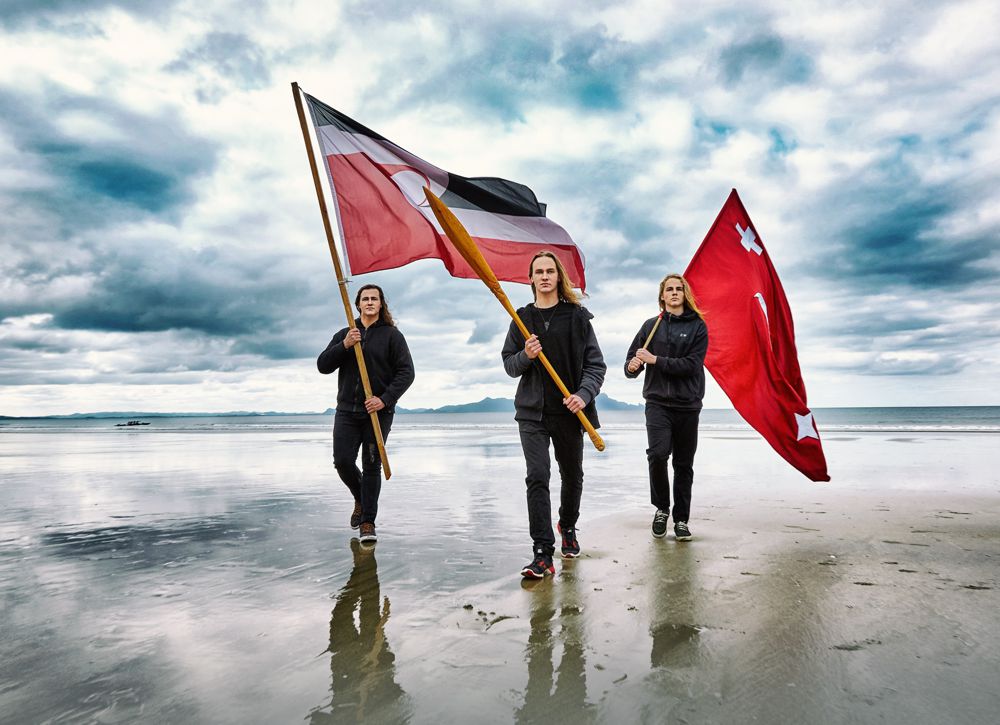
Photo By Maryanne Bilham
I’ve been wracking my brains trying to think of when last a band this young was having such an impact within the metal community, and while definitely more rock than metal it would probably be Ash, until we go all the way back to Def Leppard which was virtually forty years ago. But, while they may be young, their songwriting is complex, developed and highly political. Their live performance energy is startling, with just two fifteen-year-olds commanding the front of stage as effectively as four- and five-piece bands three times their age. But perhaps most surprising of all, many of their songs are in New Zealand’s native language, Te Reo Māori. In fact, guitarist/lead singer Lewis de Jong (15) and his brother, drummer Henry (17), are of Ngati Pikiāo and Ngati Raukawa descent – they call themselves ‘Stealth Māori.’ They attended a full immersion kura kaupapa Māori (Māori language school) until they were seven years old, where singing waiata and performing haka were a daily routine. Also ingrained in their early learning were stories of New Zealand history from a Māori perspective. In September 2017, they won the prestigious APRA Maioha award for their song “Raupatu” – a thrash metal commentary on the 1863 act of parliament that allowed the colonial government to confiscate vast areas of land from the indigenous Māori people. They have already been nominees at the Vodafone New Zealand Music Awards.
The combination of thrash metal with Māori history and language has proved popular. Their latest music video for “RūAna Te Whenua” has more than a million Youtube and Facebook views, spent 2 weeks at no. 1 on Spotify’s NZ Viral chart, and hit no. 2 on the iTunes global metal chart (just behind Iron Maiden’s “Run to the Hills”). The band’s music has been playlisted on stations in New Zealand and around the world – from Scotland to Brazil, as well as the USA, Australia, and Germany. They are creating a real stir here in NZ, so when I was given the opportunity to interview them it seemed like a great opportunity, and I caught up with Lewis, as follows.
Kia ora koutou
Tena koe, e hoa
What or who first inspired you to form a band?
Our Dad was a musician, so there were always instruments about the house and we always had music playing, so it was almost part of our DNA. When I was little, I used to watch a DVD of Stevie Ray Vaughan, and that was what first inspired me to learn guitar. We also listened to a lot of Metallica, and I wanted to be like them, so I would have to say Metallica was our inspiration for forming a band. I used to imagine James Hetfield knocking on our door and dropping in for a jam.
How did it come about that you decided to perform songs in Te Reo? I’m aware of Te Reo being used in other musical forms but have never heard it in metal
Henry and I are of Ngati Pikiāo, Ngati Hinekura and Ngati Raukawa descent, and we went to a Kura Kaupapa Māori when we were younger. When we first started writing songs, we wrote in English, but we were inspired to use Te Reo Māori because we wanted to enter a competition called Smokefree Pacifica Beats, and using Te Reo Māori or a Pacific language was one of the criteria. We were mates with the guys in a band called Strangely Arousing, who had won the competition a couple of years earlier with a song partly in Te R e o Māori. They are a SKA band, but three of them also used to play for a metal band called Aftershock. So we thought, why not try using Te Reo Māori, but stick to our metal style?
For most people around the world, their only understanding of Maori culture is from seeing the Haka performed by the AB’s. How would you describe the culture to someone who has never experienced it?
Ha, ha. Well, if your only exposure is through the AB’s haka and then you hear our music I guess it might lead some people to believe that Māori culture is very aggressive and warlike. Well, it is definitely a warrior culture, but there is also a strong connection to the natural environment and our ancestors. Māori theology says that all people are descended from Tāne (the god of the forest), and Tāne was the eldest son of Papatuānuku (the Earth Mother) and Ranginui (the Sky father). So who you are and your ancestry is very important, as is respecting the natural world. For example, if you wanted to cut a tree from the forest to make a waka (canoe) or a taiaha (long-handled club), you would say a karakia (prayer) to Tāne to thank him for that gift before you cut the tree down. Likewise, when we were kids and we used to go fishing in the river, our Dad would always make us do a karakia before we went out and we had to throw the first fish back, as a gesture of respect to Tangaroa (the god of the sea). And, we would always bury the fish bones or shells of the shellfish well above the high tide line, so as not to cause Tangaroa grief by leaving the remains of his children lying on the beach for him to see.
Waipu is a small township, how have you been able to break out of that environment and gain wider support?
I think the internet has definitely played a big part in that – we can connect to people and people can connect with us from pretty much anywhere in the world. We get heaps of messages on Facebook, Instagram and YouTube from all over the world and in lots of different languages, which is very cool. And our families have also been very supportive with us gigging and touring in NZ – my Grandma bought a van for us to use, and our parents have driven us all over the country in the past 5 years.
What have been the most important points of your career to date?
There have been a few pivotal moments. Maybe the first was when Paul Martin played some of our Demos on the Axe Attack and invited us to open for Devilskin. That definitely opened doors for us, and gave us an opportunity to play in front of some pretty big crowds when we were only 12 and 14. Meeting Tom Larkin from Shihad was another – he produced 5 of the songs on our album and really kicked our butts in the process. Working with him definitely helped us to focus and improve our playing and songwriting. Winning the National finals of both Smokefree Rockquest and Smokefree Pacifica Beats in the same year was pretty huge – it allowed us to record quite a few songs, and make videos for them too. Last year, we won the APRA Maioha Award for our song Raupatu, which was a huge honor to be recognized by other musicians in that way. Not long after that we signed a management deal with Das Maschine in Germany and got on the bill at Metaldays in Slovenia, Wacken Open Air and Summer Breeze in Germany, and Bloodstock in the UK as well as quite a few other festivals. And earlier this year we opened for Prophets of Rage in Auckland. We are all huge fans of both Rage Against the Machine and Public Enemy, so that was pretty surreal.
Have you been able to play many gigs? I’ve been aware of Alien Weaponry since the video for “Rū Ana Te Whenua” came out, but haven’t seen you play down here yet? Are there any plans to do so?
We have only played two gigs in the South Island, in October last year as part of our ‘Trembling Earth’ tour to support the release of “Rū Ana Te Whenua”. They were in Christchurch and Nelson, but we’d really love to come back and do more. People in Dunedin often ask if we’ll come down there, and we would love to play the TUKI festival in Wanaka. We are planning to tour NZ and Australia in summer 2019, so keep an eye on our Facebook page.
How did you manage to get a record deal with Napalm?
That was organized by Das Maschine. One of the first things they did when we signed up with them was looking for a record label that they felt would suit our sound, and that would benefit us to sign with. Napalm was high on their list, so we were stoked when we heard that Napalm was keen to take us on.
Have you been surprised at the speed with which everything is happening?
We have actually been playing and writing songs together for 8 years now, and there were times when we felt like nothing was happening. Definitely, since we got management and a record label in Europe, things have sped up a lot. There is only so much that can be achieved from the other side of the world. When Ethan and I were 12 and Henry was 14 we set a goal to play at Wacken while we were still all teenagers – it was a bit of a crazy goal, and we still can’t quite believe that is going to happen this year. From the feedback we’re getting about the album, there will hopefully be more overseas touring opportunities in the near future.
How would you describe the album to someone who hasn’t heard it, and would it be possible to provide a breakdown of what the songs are about and what they mean to you?
In a metal context, I would describe it as thrash/groove metal. And then, as you mentioned above, mix the thrash/groove with haka, and that’s what we sound like. We hope people will enjoy the diverse range of sounds – there are the standard instruments – guitar, bass, and drums, but we also use some traditional Maori instruments, which can sound quite eerie and atmospheric. Our songs are quite riff-based, but they also have some pretty intense drumming and bass parts – we all contribute quite a lot to the sound, as we are only a three-piece. I do most of the singing, but all of us do sing and quite often work on harmonies in our vocals. About half of the lyrics are in Te Reo Maori, which some people might find weird if they are not familiar with the language, but it almost works as another instrument, so it’s more accessible than you might imagine.
What’s next?
Well, we’re flying out of New Zealand in early July and will do 3 shows in Australia (Melbourne – 5th, Sydney – 6th and Brisbane (Dead of Winter Festival) – 7th), then we head to Europe, where we’ll be playing at 7 festivals and a whole bunch of club shows in Europe and the UK. Ethan and I have a few NCEA exams when we get back in October, and we’ll take a break for a few months to do some more songwriting – we already have a few tracks in progress for the next album. We want to tour NZ and Australia in the summer, and at the moment it looks like we will be back in Europe in the middle of next year for the festival season. We are getting heaps of requests to tour the USA and Canada so it’s likely we’ll end up there sometime in 2019 as well.
Kia ora rawa atu
Nga mihi ki a koe
Lewis also provided me with notes about each song, as below. This is an incredible piece of work, no matter what the age of the participants and part of me wonders whether or not, in an ideal world, that this could propel them in the same manner that ‘Roots’ shot Sepultura into a different game altogether. Did I mention that they are still at school??
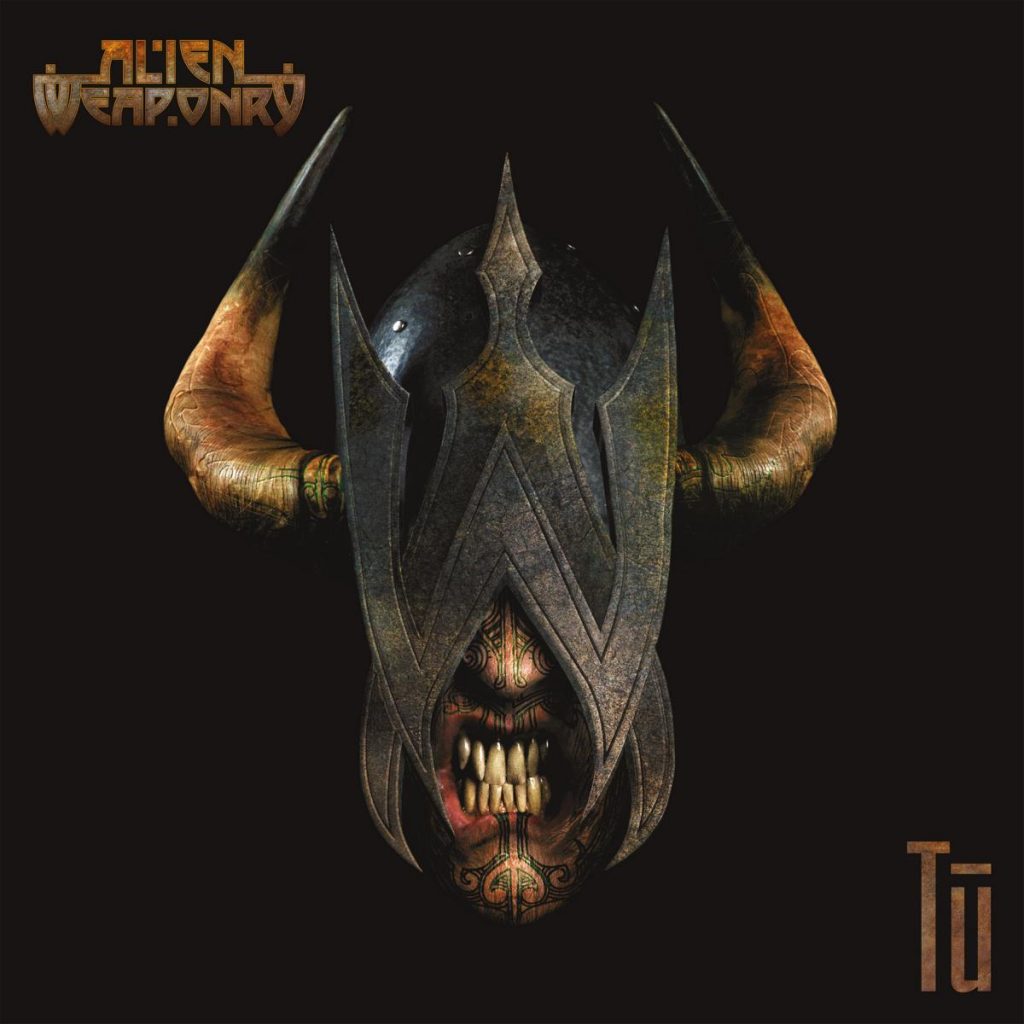
1. Whaikōrero – literally means ‘speech’ – it is an introduction to the second track, Rū ana Te Whenua, and talks about the battle at Gate Pā / Pukehinahina, where our ancestor Te Ahoaho fought and lost his life. The lyrics were written by Henry and Lewis, with some input from our father, who knows a lot about early New Zealand history, especially events relating to our family. The track was recorded in the Waipu Caves, and at the beginning, there are traditional Māori instruments – Lewis plays the Kōauau (bone flute) and Ethan swings the Pūrerehua (this literally translates to ‘Butterfly’, but the best way to describe it in English is ‘bull roarer’). The speaker is Henry.
2. Rū ana Te Whenua – this song tells the story of the 1864 battle at Gate Pā; where 230 Māori dug themselves into the hilltop at Pukehinahina and withstood the heaviest artillery bombardment the British army has ever delivered, resulting in a crushing defeat for the 1700 strong British forces and changing the course of history. Our (Henry and Lewis’) great, great, great grandfather, Te Ahoaho, died in this battle. There is also a very moving story about how after the battle, a young Māori woman, Heni Te Kirikaramu, brought water to the wounded and dying British soldiers – her compassion and the grief surrounding the many deaths are also described in the song. The lyrics were developed by Henry and Lewis, based on stories told to them by their father, and the many accounts of the battle in books and online.
3. Holding My Breath – This song was written by Lewis, about the anxiety of being judged and socially ostracized by peers to the point of being unable to function. He says: “It’s about something that actually happened to me. I felt so bad that I literally stayed in my room and couldn’t bring myself to leave the house or talk to anyone. I wrote the song at that time, and it was one of the things that helped me work through it, so I hope it will resonate with other people going through similar things.”
4. Raupatu – is about the law passed in 1863 by the colonial government in New Zealand, enabling them to confiscate land from anyone they deemed to be ‘rebels’. In this way, millions of acres were stolen from their Māori owners, plunging these communities into poverty and changing the balance of power and the face of history in Aotearoa / New Zealand forever. These unjust confiscations are known as ‘Raupatu’, loosely translated as ‘theft’. The lyrics were developed mostly by Lewis, and include sections from the Treaty of Waitangi, signed in 1840, which was supposed to guarantee Māori ‘full power and chiefly authority over their lands, people and all things of value to them’.
5. Kai Tangata – literally translates to ‘Eat People’, but refers specifically to the ancient Māori tradition of eating the flesh of their enemies after battle. In Māori custom, the human body is tapu (sacred), and the food is considered noa (ordinary or every day), so to reduce a person to the status of food was a great insult and a way of showing disdain for a fallen enemy. The lyrics were mostly developed by Henry, based on stories told him by his father about a series of intense conflicts that occurred between 1800 and 1840 when the Northern tribes were heavily armed with muskets as a result of their contact with European settlers. In a particularly savage battle in 1823, a Ngapuhi (Northern) tribe attacked and decimated the de Jong brothers’ Te Arawa (Central North Island) ancestors, who at that time were mostly still using traditional weaponry as European settlers and traders had not yet arrived in that part of the country. The verses and chants refer to the pounding footsteps of the war parties, the taking of slaves and (severed) heads, and the ‘sweet tasting flesh’ of the enemy. The chorus refers to the parts of the full body moko (tattoo) traditionally worn by Māori warriors.
6. Rage – The lyrics to this song were written by Lewis, based on an incident at school, where he told a friend something in confidence and the friend betrayed that confidence, resulting in the two of them coming to blows. The chant ‘Te ihi, te wehi, te wana’ at the end is often used in haka; and refers to the channeling of rage in order to summon power before a battle.
7. The Things that you Know – is a statement against following the rules and living a life of conformity. Written by Lewis, it expresses his own personal belief in taking risks and trying things outside your comfort zone.
8. Whispers – was written by Lewis. It is a reaction against people in power showing blatant disregard for the voices of the people (specifically Māori) in important decision making. The Māori verses relate to two recent incidences of this in New Zealand. The first was in 2004, when the government legislated to put the foreshore and seabed around the coastline of New Zealand into government ownership, even though it had never been gifted, sold by or confiscated from its traditional Māori owners. Henry and Lewis (then aged 2 and 4) and their family were among 40,000 people who marched on parliament to oppose the legislation; and a government MP, Tariana Turia (who is mentioned in the song) crossed the floor to vote against her own party, and subsequently resigned and formed a new political party, over the incident. The second incident was the participation of New Zealand in the Trans-Pacific Partnership Agreement (TPPA), which overrides a number of rights granted to Māori in the 1840 Treaty of Waitangi, and which has been negotiated and progressed without any genuine consultation with the many Māori tribes affected. The spoken excerpt at the beginning of the song is part of a radio interview with Don Brasch, a former leader of the (right wing) National and (even more right wing) Act political parties, and current spokesperson for a lobby group specifically set up to remove so-called ‘special privileges’ for Māori which have been put in place by various and successive governments since the 1980s in order to in some small way compensate for and right the wrongs inflicted on Māori by previous governments, who (among other things) stole their land, excluded them from voting and punished their children for speaking their own language in schools.
9. PC Bro – was written by Henry as a reaction to the modern phenomenon of reality TV shows, where the stars do more and more ridiculous and destructive things to feed the ever-increasing demands of the masses who blindly watch and follow them. The song gets its name from an episode of South Park, which deals with the same themes.
10. Urutaa – was originally written by Lewis about how conflicting expectations between people can spread unhappiness like a plague (urutaa). The Māori lyrics refer to specific events which occurred in Whangaroa harbor in the Bay of Islands, culminating in the famous incident known as ‘The Burning of the Boyd.’
In 1808, a European brig, ‘The Commerce,’ with Captain James Ceroni at the helm, landed in the harbor. In the process of showing off his pocket watch to local Māori (Ngati Uru), he dropped it into the harbor and it was never recovered. The ship left in the night, without the proper farewells, raising concern and superstition among the locals. Their concerns appeared to be vindicated when, a few days later, an epidemic broke out in the tribe, killing many people including the chief Kaitoke. (The epidemic was most likely influenza, caught from the visiting sailors, and the local people would have had no immunity to such foreign illnesses.) The plague was attributed to the cursed object (the pocket watch) left in the harbor and the survivors vowed vengeance against the white skinned or ‘spirit’ people (patupairehe).
A year later, another European ship, ‘The Boyd,’ landed in Whangaroa, and it was on this vessel that the revenge was exacted. Half the crew was lured up the river with the promise of kauri (tall tree) spars, which they were seeking as cargo, but they were killed and eaten by Ngati Uru. The warriors then donned the unfortunate sailors’ clothing, launched their rowboats and returned to The Boyd at dusk, where they proceeded to massacre the remaining crew and passengers. In the process, the ship’s load of gunpowder was set alight, resulting in The Boyd catching fire in a spectacular and gruesome event that was reported around the world.
This incident is used in the song as a metaphor for the misunderstandings that continue to plague us today – between cultures, generations, and individuals who torment each other through lack of understanding.
11. Nobody Here – Lewis wrote this song about the frustration of all his friends sitting at home on Facebook and other social media, and not actually engaging with each other in the real world.
12. Te Ara – This is a mostly instrumental song, featuring traditional Māori instruments – Lewis plays three different Kōauau (flute), Ethan plays the Pūrerehua (bullroarer) and Henry plays the Putatara (conch shell) in several different ways – he speaks through it, sounds it like a horn, breathes through it and ‘drums’ the neck opening. ‘Te Ara’ means ‘the journey’ and this song tracks the journey of the de Jong brothers’ ancestors in the waka (canoe) Te Arawa from their ancestral homeland in Hawaiki (French Polynesia) to the shores of Aotearoa / New Zealand. The haka at the end of the song is an ancient one, said to have been composed by the people of Ngati Ohomairangi (the tribe descending from the ancestor Ohomairangi) to celebrate their safe arrival in their new homeland.
13. Hypocrite – This is the oldest song on the album, and it was composed by Lewis in response to one of his teachers at school, who dished out detentions to him and a friend for not adhering to the school dress code and was subsequently observed several times to be contravening it themselves.
Follow Alien Weaponry
Official Website
http://alienweaponry.com/
Facebook
https://www.facebook.com/AlienWeaponry/
Interview w / Steffany Johnston – Vocalist Masqued
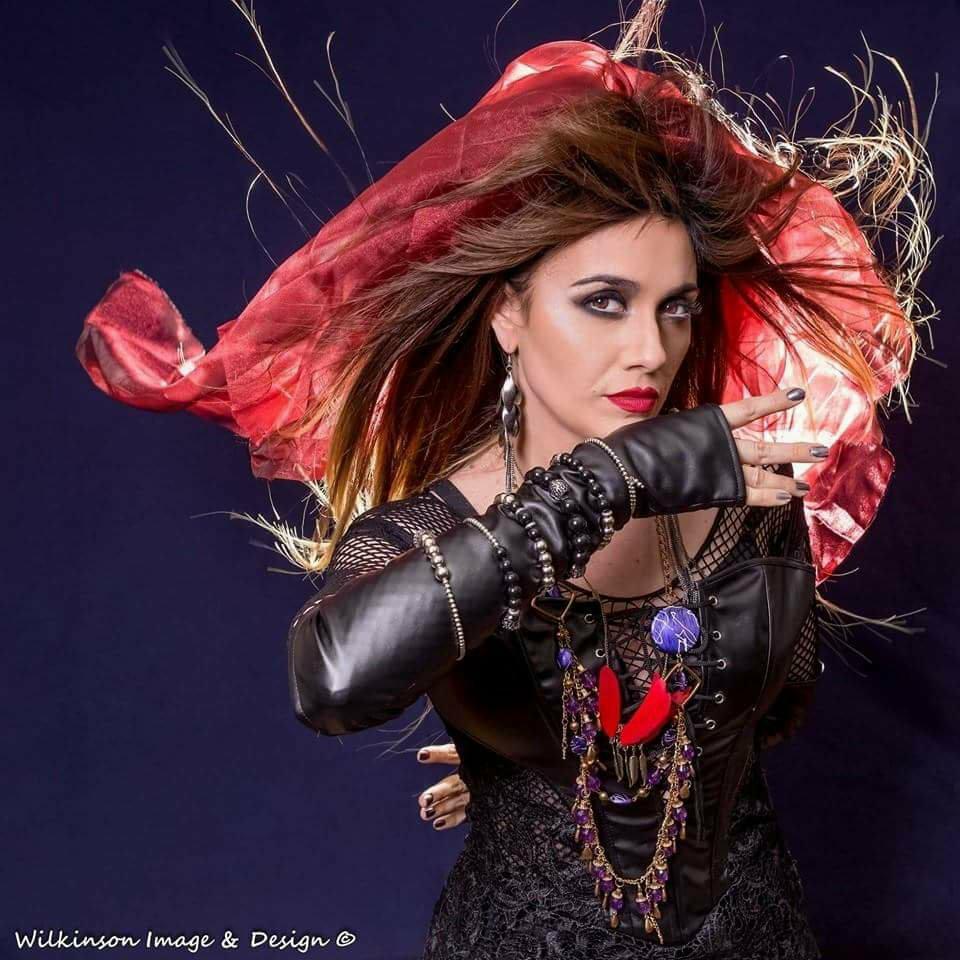 Interview w / Steffany Johnston – Vocalist Masqued
Interview w / Steffany Johnston – Vocalist Masqued
Houston Texas now has to its credit a progressive metal band that owns my Top 10 Progressive Metal Albums Of 2017 with Masqued -The Light In The Dark. Coming off a year where the area has damaged on a wide scale to Hurricane Harvey the band Masqued puts out a very positive and uplifting progressive metal album that seems to be lacking in the genre at times. Well this is not the case if Masqued’s lead vocalist Steffany Johnston has something to do with it. Trained at the University Of Houston in Voice and Music and expressing her lyrical ideas with a lifetime of experience at her back Steffany Johnston brings a level of positive enlightenment in the bands debut album The Light In The Dark.
She recently gave Power Of Prog some precious time with the interview you will read below. Bands like Nightwish, Epica, Within Temptation and Delain are on notice that another band with a powerful minstrel are on the way up.
First of all Steffany it is great to have you here at Power of Prog. Welcome !
1) This is one of the more obvious questions, what or who influenced your journey into music and how young were you when that had taken hold of you?
It always did. As far back as I could remember, I always knew what I was going to do since I was 4. The first song I remember writing was when I was 6 years old. I always wrote songs. When I got a little older they would come to me in my sleep and in the middle of taking test, when I would write papers, when I would watch t.v., when I would eat, when I was driving. I can’t tell you how many times I had to pull over to write, record or notate my song ideas. I remember being late for things because an incredible song idea would appear as I am getting ready to leave for some event. It was a blessing and a curse all rolled into one lol. I also started playing piano when I was 6 and continued throughout the years and still do today aside of the band, and at the age of 12 I started playing the guitar. I would lock myself away in my room chunking away at rhythms and lifting metal guitar solos. When I was 18 I got a bass and bought some recording gear and would be late for dinner due to writing and recording original songs. I knew that one day I would form a band when I was old enough. I remember running an add in the paper when I was 14 years old, looking for other musicians to start a band with. When I turned 20 I started making a living playing bass guitar and singing locally and internationally. I have performed in numerous bands through out the years and am now grateful to have my place as the vocalist of Masqued.
2. Are you formally trained in music and if so where did you begin your study?
Yes, I have a Vocal Performance/Music degree from the University of Houston. Studying vocal performance, orchestration, arranging and opera. I would perform with the orchestra and with many famous conductors one of them being world renknown Robert Shaw.
I remember driving to school listening to Jazz and fusion then staying at the university all day practicing classical music with the chorus and opera then heading off to practice or to gigs with my rock band. I was like “where do I really fit in? I liked it all and wanted to do it all, I remember feeling so different from most of the people I knew.
3. Do you have any influences outside music that influences any instrumental or lyrical passages in your music?
I believe everything I have encountered over the years has embedded itself in some way in my state of being and comes out to play in my writing. I see a lot of injustice all around and it affects me deeply. Its hard to keep silent when I can demand better for myself and others, to fight for a noble cause or to see the hurting and to bring them a sense of hope. We are all human and are in this mad house together.
4. Your debut album The Light In The Dark is loaded with a lot of very positive and uplifting music, this is something that is becoming lost in the metal or progressive metal communities. Where do you get your lyrical inspirations from?
I feel that there is so much darkness and chaos in the world that it is important to present the trials and then provide a solution, a way of resolve. Music is so powerful, it can give you the will power and strength to get up out of bed after suffering spells of hopelessness from a loss, an injury or failure, sparking new life into you that inspires you to live on. Music also has the power to curse you, to sentence you further into despair when your already down, sometimes so much so that you lose the will to live. You have to be careful with words…there is so much power in what you allow into your mind on a daily basis via words/lyrics and what you speak out into existence. Our themes lyrically are those of liberation, speaking out against hate crimes, fighting for our freedom, finding hope and the strength to live when you have lost the will. We are not going to just lay down and die. Its all powerful stuff. I have heard numerous testimonies of people finding solace in our music. It makes me feel like this is what its truly about, being a bright light in a very dark tunnel, hence the album title “light in the dark.” Life can be brutal.
5. What band or who would be a dream for you to open up for, co headline with for a live show?
Metallica, Iron Maiden, Megadeth, Nightwish, Within Temptation and so many more.
6. If you had any concept album in you what or who would it be about ?
That is a fantastic question Robert and requires more thought on my end. Perhaps our third release will be a concept album. You have sparked my interest
7. I noticed that Light In The Dark as a album are pretty much straight away rock and metal tracks with hardly a hint of anything like a ballad, was that intentional or just how the album came to it creation?
Haha! Yeah, it just kind of happened that way. However, we have been working on a new collection of songs and yes, there are some brooding ballads. We are all really enjoying and are excited about this stuff.
8. Where did the name Masqued come from?
Choosing a band name was most difficult lol. It is kind of a blur, though I do remember one of my band mates throwing that name out there and it took off in my mind. I found the name rather intriguing with an element of theatrics and mystery. I really like the name and am glad we all agreed.
9) Out of all the music festivals that seem to come back around in Europe and the USA every spring and summer, what would be your dream festival to appear on?
Gosh there are so many…hmmm…I would say any of the Prog Power festivals would be great and definitely Wacken Open Air Festival would be stellar along with Chicago Open Air. To have a prime time spot would be the dream of dreams.
10. What are plans for Masqued by way of touring and performing in 2018? Are you booked for any shows yet?
Absolutely! We have some great shows in the processed of being solidified and will be making announcements soon though I can say the Female Metal Event in the Netherlands is one of our stops. Sooo exciting! Is there any ideas brewing for a follow up to your debut album? Yes, we definitely have a second album cooking right now. I am loving the new stuff, it just keeps getting better and better. So exciting, more great Masqued music IS in the works!!
11) When most bands with both a female and male vocalist are going with the more harsh growls ‘Beauty & Beast’ style vocal, you are your male counterpart Shane DuBose have chosen to go against the grain as it is and remain with clean vocal styles. Was this always the goal of Masqued or did it just happen this way through the evolution of the band?
We admire a great growl and scream but I think we do what is most natural to us. Who knows what will evolve in the future, anything is possible. I can say that we pride ourselves on such a melodic construct and rich harmonies. There is a lot going on in our music, a ton of musicality is what you will find from each Masqued member.
12. The final question, do you have any parting words for your existing fan base or any future fan base that takes interest in Masqued?
First of all I want to thank you all for your love for music and keeping the scene alive. We thank all of our existing fans for your unfailing love and support of us and we Masqued, are looking forward to reaching out and connecting to all of you new fans out there, all over the world. Where ever you are in your journey of life we hope to share it with you through this music; the human experience is very real and can reach great states of joy and punishing sorrows. In all the laughter and tears, we can travel this road, through music that bands us all together. We love to hear from you, messages us anytime, You can connect with us via
Women In Rock # 2 | Amanda Hammers | Sunshine and Bullets
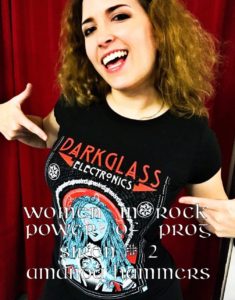
Women In Rock Series # 2
Amanda Hammers
Bass/Vocals | Sunshine & Bullets
There is a lot of very talented women in today’s musical atmosphere. However in a era that is so overly bombarded by how a woman comes off in her physical appearance it can become very monotonous into overkill where true talent can not be appreciated at its true value. In this 14 part Women in Rock Series here at Power of Prog, I have chosen to spotlight women who prove that music is far more than ‘Eyecandy’. In music there is substance and grace. That is where Amanda Hammers, bass player/vocalist of Florida’s very own Sunshine & Bullets fits the bill.
Lyrically Sunshine & Bullets are as introspective as The Cranberries meets Grace Potter. Melodically the band is this side of the heavier more hard rock version of Portishead meets Paramore. There music is partially science fiction from there debut Triangulum Mechanism to very heavy social commentary on their latest EP release Centauri Conspiracies Part 1 both available on Melodic Revolution Records. I recently caught up with Amanda Hammers for a interview. The following below is the interview. ‘SORRY’ guys Amanda is spoken for !
POP – Hello Amanda thank you for joining us today?
AH – It’s a pleasure to be here!
POP – What was the very thing that started your musical journey and how long have you been on this journey?
AH – It all started in 2nd grade. I had an inspiring music teacher, Mr. Carter. Without him, I wouldn’t be joining you today.
POP – What kind of musical background do you come from? What did your parents have as music in the home during your upbringing ?
AH – My mom loves to listen to music to dance to, and my dad is more of a rock guy. I like both, but when I got older I kept “borrowing” CDs from my dad’s collection. Aerosmith’s Toys in the Attic was my gateway drug.
POP – What band , artist or genre allowed you to fork off into heavier rock music?
AH – Although Aerosmith was good, I needed music of my own, so I developed an addiction to Nine Inch Nails and Marilyn Manson.
POP – Probably a question most asked, how did you find your way into the creation of Sunshine & Bullets?
AH – I had been in bands with both Rich and Kyle before, knew they were both ridiculously talented and fun to hang out with, so all I had to do was introduce the guys, get all 3 of us in a room together with some instruments, and the musical chemistry just sparked!
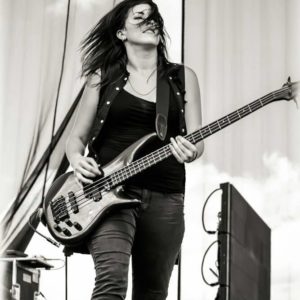
POP – For the fellow musicians out there, describe your musical gear you use in both studio and live in concert?
AH – Live, I use a couple of Dean Pro Edge 5 basses. The red one is standard tuning, just dropped half a step on all the strings, but the black one is drop tuned further, depending on which song I need it for. My Darkglass B7K Ultra is my lifeblood pedal! The character on that thing is beautifully dirty but still clear and low. I also use an EHX Micropog for that 12-string bass feel. I love the new D’Adarrio NYXL bass strings, and my current head of choice is a Hartke LH1000 with a Hydrive 8×10. If it’s good enough for Wooten, it’s more than enough for me!
I use basically the same things in the studio, but I’m not afraid to experiment with different things to get different sounds and tones if the song calls for it.
POP – Is there any current band or artist whom you would like to guest on their project and why?
AH – I’d love to work with someone like Eminem. He’s got this energy about him that is manic crazy yet bare bones honest.
POP – What are your goals going forward both with Sunshine & Bullets and solo?
AH – We’re continuing to write new material, release a new album, make more videos, all that good stuff. Rich and I are starting to make our wedding plans, but no date yet. As for goals, I like to keep it open-ended and simple: Have fun, and hopefully inspire others to do what they love!
Video Courtesy of : ( Sunshine & Bullets Official YouTube Channel )
Contact Links
Sunshine & Bullets Official Website
Sunshine & Bullets Official Facebook Page
Sunshine & Bullets Official YouTube Channel
Women In Rock Series #1 Lindsay Schoolcraft/Cradle Of Filth
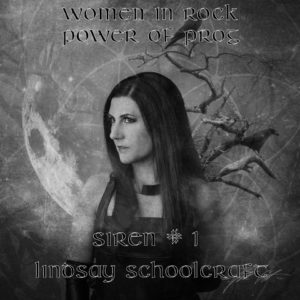
Women In Rock Series #1
Lindsay Schoolcraft/Cradle Of Filth
Keyboards/Vocals/Harp
Ever since Cradle Of Filth introduced me to Lindsay Schoolcraft, she has become a very interesting musical enigma to me. For being involved in such a Extreme Symphonic Black Metal outfit, Lindsay’s musical interests are very vast. Her classical music influences contain some of the very legends responsible for modern contemporary music, and classical musical influences that are still very relevant in the 21st century.
In a world culture that places such high and yet superficial regard on appearances, women like Lindsay are challenging the conventional wisdom. Women in Rock & Metal have been measured with a two edged blade on body parts and actual musical talents. In the first installment of this Women In Rock Series, we will talk and focus more about talent and training. We will also see how a young aspiring Canadian musician made her way into one of Heavy Metal’s most legendary bands in Cradle Of Filth.
Thank you Lindsay for joining us. It is great having you.
“Thank you so much for having me!”
What was the very thing that started your musical journey and how long have you been on this journey?
“Music was in my life from a very young age, but I didn’t decide to take it seriously until my mid teens. As cliche as it may sound, I got my biggest inspiration from the movie Josie and The Pussycats when I was 15. It sparked the fire in me and I’ve been hungry about my passion for writing and performing music ever since. Of course many other artists have inspired me along the way to keep going.”
You come from a classical background, who in the world of classical music influenced and inspired you?
“I would have to say Bach, Wagner, and Carl Orff have been the biggest contributors to my love of classical music. My training has been through the Royal Conservatory of Music and they have exposed me to so many composers. I’ve even done studies in jazz and folk through them.”
What metal band , artist or genre allowed you to fork off into metal?
“My first exposure to metal was with Kittie when I was in high school. I had mainly taken a lot of influence from post 90’s nu metal during that time. In my early twenties I was introduced to Kamelot and Nightwish, but I didn’t get extremely passionate about metal until I was shown Dimmu Borgir. They were everything I loved about classical and black metal forged together. I’m still anxiously waiting for their new album.”
Were you inspired by more than just musicians as artists ie, painers, acting, book authors ?
“Absolutely. I’ve always gravitated towards visual arts. There was always a style I had in mind for my drawings and paintings and in high school and then I found out it was very close to the style of art nouveau. I adore Alphonse Mucha and his legacy. There also movies that have inspired me over the years. Mainly the horror rock opera “Repo! the Genetic Opera”. So you can imagine I was over the moon when the creator and main actor Terrance Zdunich contacted me earlier this year and asked me to be part of his new art project: American Murder Song.”
Probably a question most asked, how did you find your way into Cradle Of Filth?
“To this day I still have to pinch myself and ask if it ever even happened, because it’s changed my life forever. I was connected to them by a friend over good old Facebook back at the end of 2012.”
For the musicians out there, describe your musical gear you use in both studio and live in concert.
“In the studio I use my Yamaha portable grand piano with midi through Protools. For vocal and harp tracking we use . You’d have to actually talk to my producer Tyler Williams at Monolothic Productions. He is a real gear head and I am still just learning, slowly. Live I use my Shure in-ears along with my Sennheiser wireless pack. I play a NuMotion Revo 1 keyboard. There is more gear to list, but I don’t want to overly bore the readers with it.”
Is there any current band or artist whom you would like to guest on their project and why?
“There are too many. My top ones would have to be possibly getting a guest vocal spot on a song with Dimmu Borgir, Chevelle, or Kamelot. But I’d also love to collaborate with The Weeknd! I know that sounds crazy, but I enjoy copious amounts of trip hop and, for some reason, The Weeknd’s work really resonates with me. Passion speaks through music no matter what the genre, you can hear it in his voice and songs. And I’ve always wanted to sing a duet with Jon Crosby of VAST and Adam Roth of Broken Iris.”
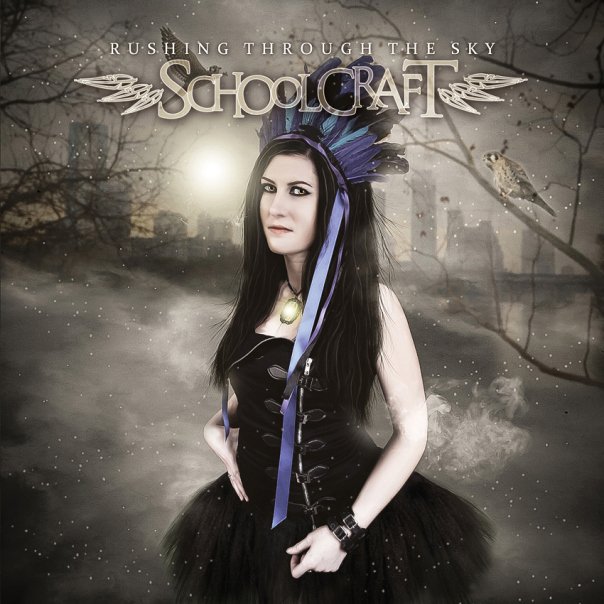
What are your goals going forward both with Cradle of Filth and solo?
“For Cradle there is less stress on me when it has come to writing our new album together. It is a group effort and we all split up the tasks fairly. I am mainly back to working on strengthening my voice so it can be strong for this next album and live. The live show with Cradle will be my biggest focus this year.
As for my solo project there is more pressure and responsibility since it is currently only a two person venture. I am just half way through demoing the new album and working on collaborating with a big name that I think a lot of people are going to be very excited about, once announced. No word of live shows yet, I’d rather just get the album sorted first for going into production this year.”
Thank you for joining us, is there anything else you would like to share with the readers?
“Thank you for having me! Be sure to check out my social media for lots of big announcements and new music coming this year!”
Lindsay Schoolcraft Social Media
Lindsay Schoolcraft Official Facebook Page
Lindsay Schoolcraft Official Bandcamp Store
Lindsay Schoolcraft Official Twitter
Lindsay Schoolcraft Official Instagram
Lindsay Schoolcraft Official Tumblr

